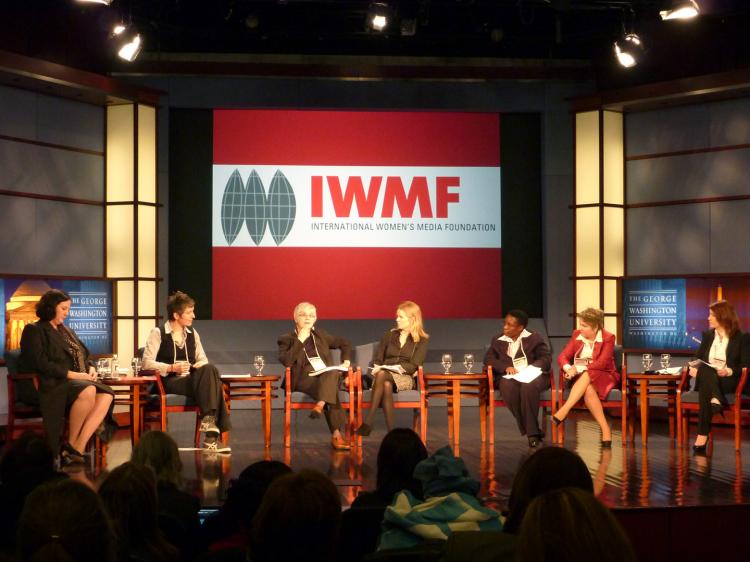WASHINGTON—Women actively working to promote women in media, gathered in Washington for a conference March 22–25 involving more than a few high-profile guests.
The International Women Media Leaders Conference kicked off on Tuesday night with a headline interview with ABC World News anchor and celebrity journalist Diane Sawyer. Warren Buffet and Matt Winkler, editor-In-chief and co-founder of Bloomberg are also part of the lineup.
But the main focus of the working conference remains the 70 women delegates, all powerful executives in their own right, representing media organizations in 25 countries.
The first order of business was a panel discussion and the unveiling of a long-awaited report on the status of women in media. (Download Report)
A select group of media executives appeared on a panel to discuss the report with Katty Kay of BBC World News. Kay is also vice chair of the nonprofit International Women’s Media Foundation (IWMF), the conference organizers.
“The people that are here are strong,” said conference manager, Jan Du Plain.
“It is not easy to take off for a week and come to the conference. So we know the women that are chosen are serious and understand the importance of it,” she added.
The report is the first large-scale systematic study to address the issue of gender distribution in the media workforce specifically. It found that women occupy just one-third of all positions within the 522 companies surveyed.
Completing the report was a mammoth task, involving 16 regional coordinators working with a total of 150 researchers, multiple translations of a single 12-page questionnaire, 522 media companies, 60 countries, 170,000 jobs accounted for, and finally—a reliable database, said Dr. Carolyn M. Byerly, lead researcher and principle report author.
“Women in the journalism profession have had a sense that they were doing better in some parts of the world than others, and our study actually brings a clearer magnifying glass to that,” said Byerly, also a communications professor at Howard University.
The report revealed that there is a particularly low representation of women at the senior and board levels, just 27 percent. Compared with a previous study conducted in 1995, the disparity in this area is closing. Women held just 12 percent of the top jobs 15 years ago.
Eastern Europe and Nordic Europe come in at the top end of the senior management scale, with 43 percent of jobs held by women. Regions where women have the lowest representation are Asia and Oceania, at 13 percent.
On average, women hold 41 percent of the senior news-gathering, editing, and writing jobs. Among junior reporters, they hold 36 percent of the positions.
Panelists discussed in detail the challenges faced by women in the news industry. From their vantage point, enforcing hiring equality and increasing the representation of women in the news requires vigilant effort and dedication to hold colleagues accountable to stated policies.
The study found that slightly more than half of companies surveyed have some form of established policy on gender equality.
There needs to be active involvement and participation from top management, and then you work with the culture and attitudes within the organization, said Kjersti Sortland, managing editor with Verdens Gang, Norway’s second largest newspaper. Ines Pohl, managing editor of German national newspaper, Die Tageszeitung, said her newspaper has a strict quota for every section, and well as management. For 20 years now, it has been required that the gender mix be 50/50.
“It is important that female leaders are visible,” said Pohl.
Conference delegates felt strongly that women should be represented equally within news organizations, and that stories important to women should be represented more often.
“Journalism is about choices and choices are defined by those who make them,” said panelist Jennifer McGuire, Canadian Broadcasting Company general manager and editor-in-chief.
“The public sphere only has women’s voices in it, by virtue of media,” said Byerly.
Sortland said at her newspaper they have a rule that every front page must contain at least one photo of a woman. Even this is hard to manage some days, she admitted.
Delegates also discussed the challenges for women working in media. They need more encouragement to have the confidence to tackle some of the tough challenges, such as investigative journalism.
Perhaps there is a lack of adequate role models, suggested a few of the delegates.
“We have to challenge women to be more educated and encourage them to jump into the story because we have a lot to share with people and I think it is a good moment for women’s media,” said Silvia Miró Quesada, senior editor with Peru’s oldest newspaper, El Comercio.
During the week, delegates will participate in work-focused, breakout sessions. A panel discussion on Thursday will feature a discussion with Howard Buffett, from the Howard G. Buffett Foundation, Matt Winkler, editor-in-chief and co-founder of Bloomberg News, and Alberto Ibargüen, president and CEO of The John S. and James L. Knight Foundation.
On the last day, delegates will vote on key priorities that regional representatives will take back and continue to work on, with the support and mentoring of IWMF.
The International Women Media Leaders Conference kicked off on Tuesday night with a headline interview with ABC World News anchor and celebrity journalist Diane Sawyer. Warren Buffet and Matt Winkler, editor-In-chief and co-founder of Bloomberg are also part of the lineup.
But the main focus of the working conference remains the 70 women delegates, all powerful executives in their own right, representing media organizations in 25 countries.
The first order of business was a panel discussion and the unveiling of a long-awaited report on the status of women in media. (Download Report)
A select group of media executives appeared on a panel to discuss the report with Katty Kay of BBC World News. Kay is also vice chair of the nonprofit International Women’s Media Foundation (IWMF), the conference organizers.
“The people that are here are strong,” said conference manager, Jan Du Plain.
“It is not easy to take off for a week and come to the conference. So we know the women that are chosen are serious and understand the importance of it,” she added.
The report is the first large-scale systematic study to address the issue of gender distribution in the media workforce specifically. It found that women occupy just one-third of all positions within the 522 companies surveyed.
Completing the report was a mammoth task, involving 16 regional coordinators working with a total of 150 researchers, multiple translations of a single 12-page questionnaire, 522 media companies, 60 countries, 170,000 jobs accounted for, and finally—a reliable database, said Dr. Carolyn M. Byerly, lead researcher and principle report author.
“Women in the journalism profession have had a sense that they were doing better in some parts of the world than others, and our study actually brings a clearer magnifying glass to that,” said Byerly, also a communications professor at Howard University.
The report revealed that there is a particularly low representation of women at the senior and board levels, just 27 percent. Compared with a previous study conducted in 1995, the disparity in this area is closing. Women held just 12 percent of the top jobs 15 years ago.
Eastern Europe and Nordic Europe come in at the top end of the senior management scale, with 43 percent of jobs held by women. Regions where women have the lowest representation are Asia and Oceania, at 13 percent.
On average, women hold 41 percent of the senior news-gathering, editing, and writing jobs. Among junior reporters, they hold 36 percent of the positions.
Panelists discussed in detail the challenges faced by women in the news industry. From their vantage point, enforcing hiring equality and increasing the representation of women in the news requires vigilant effort and dedication to hold colleagues accountable to stated policies.
The study found that slightly more than half of companies surveyed have some form of established policy on gender equality.
There needs to be active involvement and participation from top management, and then you work with the culture and attitudes within the organization, said Kjersti Sortland, managing editor with Verdens Gang, Norway’s second largest newspaper. Ines Pohl, managing editor of German national newspaper, Die Tageszeitung, said her newspaper has a strict quota for every section, and well as management. For 20 years now, it has been required that the gender mix be 50/50.
“It is important that female leaders are visible,” said Pohl.
A Women’s Voice
Conference delegates felt strongly that women should be represented equally within news organizations, and that stories important to women should be represented more often.
“Journalism is about choices and choices are defined by those who make them,” said panelist Jennifer McGuire, Canadian Broadcasting Company general manager and editor-in-chief.
“The public sphere only has women’s voices in it, by virtue of media,” said Byerly.
Sortland said at her newspaper they have a rule that every front page must contain at least one photo of a woman. Even this is hard to manage some days, she admitted.
Delegates also discussed the challenges for women working in media. They need more encouragement to have the confidence to tackle some of the tough challenges, such as investigative journalism.
Perhaps there is a lack of adequate role models, suggested a few of the delegates.
“We have to challenge women to be more educated and encourage them to jump into the story because we have a lot to share with people and I think it is a good moment for women’s media,” said Silvia Miró Quesada, senior editor with Peru’s oldest newspaper, El Comercio.
During the week, delegates will participate in work-focused, breakout sessions. A panel discussion on Thursday will feature a discussion with Howard Buffett, from the Howard G. Buffett Foundation, Matt Winkler, editor-in-chief and co-founder of Bloomberg News, and Alberto Ibargüen, president and CEO of The John S. and James L. Knight Foundation.
On the last day, delegates will vote on key priorities that regional representatives will take back and continue to work on, with the support and mentoring of IWMF.







